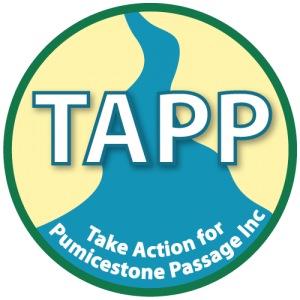Pumicestone Catchment Convergence
Minutes from Summary Session – 17 & 18 February 2021
Mike Ronan – Presentation of summaries and research gaps Days 1 & 2
- Values of catchment have been reiterated
- Cultural, tourism, recreation
- Baton been passed on
- Management day at the end bring it all together
- Capturing traditional knowledge – shell middens still much to learn
- Innovative- mangrove rehabilitation – not many projects like it
- Shellfish reef project – ultimate finding will be hugely beneficial
- Research on fish is world leading
- No map of intertidal areas in the passage – this needs to be pulled together
- Agriculture sector – gained some empathy, difficult catchment to farm due to soils
- Forestry industry – very difficult impact challenges
- Planning tools, CHAS
- Constructed wetlands, floating wetlands, bioreactors
- Tremendous work by community groups & land for Wildlife program
- Litter – no excuse, enormous impact on our values, crept up on us
Gaps
- Whole of system, value-based approach, need to link it all together
- More information on threatened species
- Need more monitoring of shorebirds
- Need to know more information on the dynamics of the passage
- Threats – weeds & feral, jellyfish, Lyngbya – monitoring required for better management
- Dugongs & turtles in the passage – more research needed.
Q: DO you see the wetland page as the home of a lot of this information?
Mike: yes. Need to keep adding to it.
Summaries by session hosts:
- Traditional Knowledge & Projects – Susie Chapman
- Big difference between last conference with no traditional owner projects to report on
- Midden mapping- need funding for continued mapping
- Cultural fire management in its infancy
- Mangrove approval process prohibitive, needs more funding and mapping
- Still got a long way to go for all families involved and empowered with funding, resources and time.
2) Community knowledge and Stewardship – Peter Armstrong
- Community champions
- Continued involvement over the years
- Plants in grounds, citizen scientists
- Inspiring video from Tangalooma Ecomarines
- Discontinuity of funding
- Want partnerships rather than blocks put up
- Marine Habitat & Species – Ben Gilby
- Innovative research
- World leading
- Increase in knowledge since last conference
- Stories of good and bad
- Issues of sediment
- Jellyfish
- Lyngbya blooms
- Rapid decline in shorebird abundance
- Significant gaps in our knowledge of dugongs and water mouse in the catchment
- Positive oyster reef projects
- Improvements in WQ values
- Good social values and use in passage
- Still don’t understand marine habitats in the passage
- Multiple use marine habitats, multiple objectives, maximise our management
- Climate Impacts & Adaptations – Gabriel Conroy
- Complex issues
- Highly contested issue
- SCC and MBRC CHAS- good job representing complexity of issues and importance of good stakeholder engagement, multi criteria analysis of risks
- Bribie island break through, long shore drift, ever evolving landscapes, break through inevitable but what we do next is significant
- Multi-disciplinary team USC and SCC ecosystem services- innovative GIS modelling to understand how people understand the audience
- All voices and equally important
- Terrestrial Habitat & Species – Ben McMullen
- Dynamic and diverse remnant veg communities
- Many RE’s are not well represented in conservation estates
- SCC ecological values in their LGA – fragmentation model. Small number of areas well integrated and large number of fragmented areas.
- Land for Wildlife, many people doing exceptional work. Program has continued to draw new people over decades. Highly depended on goodwill of future landholders.
- Biosecurity – 41 high priority species, LG’s responsible for the rest, hobbies responsible for a lot of spread.
- Fragmented vegetation can support high biodiversity as proven by citizen science in the Aura estate.
- Measured and considered approach to environmental values before management decisions made.
- School kids provided an inspiring video of the future generation and sustainability.
- Agricultural Knowledge & Science – Rachel Abel
- Growers are stewards of their own land
- Research limited by funding
- Horticultural systems complex
- Small group extension staff working with growers
- No economic incentives for practices that promote env sustainability
- Sustainable Development – Claudia Balwin
- Managing for outdoor recreation, maintaining biodiversity & ecosystem services
- Water resilient coast & wetlands. Reduce demand on water supply while improving water quality.
- Managing multiple objectives.
- This requires collaboration and good partnerships
- Summary of plenary session by Mike Ronan – Graham Webb
- Walking the Landscape process was pioneered in the Pumicestone Catchment
- Integrated holistic picture of the catchment
- Strong understanding of our catchment to empower management
- Need to review catchment story and update
- Surprised by how much I learnt over the last 2 days – very impressed by the range of activities going on
- Working in environment and NRM we have a strong regional platform
- Level of engagement
- Tomorrow will be about identifying knowledge gaps, management/emerging issues, opportunities (including funding e.g. RRI)
- Population growth – impacts, pressures, climate change, poor behaviour
- Let’s aim for improvement in the catchment!
